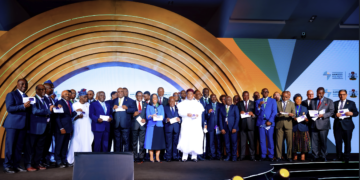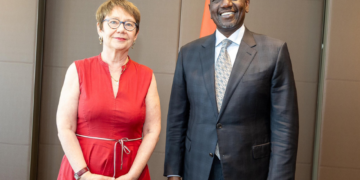The Lagos State Commissioner for Tourism, Arts and Culture, Mrs Toke Benson-Awoyinka, has urged stakeholders to stay ahead of emerging trends in the sector to remain competitive and relevant.
According to the commissioner during the ministry’s Stakeholders’ Engagement with the Hospitality Sector held at Eko Hotel, Lagos, Mrs. Benson-Awoyinka said emerging trends in the sector such as digital transformation, eco-tourism, and personalised customer experiences are reshaping the way hospitality businesses are being done.
The theme of the engagement was, “Addressing Current Industry Challenges, Exploring Emerging Trends, Understanding Policy Frameworks and Unveiling Collaborative Opportunities Within the Entire Hospitality Value Chain.”
The Commissioner said “The hospitality sector plays a vital role in the economic development of Lagos State. This sector not only employs thousands but also serves as a gateway for showcasing our rich cultural heritage, vibrant arts scene, and unparalleled hospitality.
Benson-Awoyinka said that the engagement with tourism stakeholders in the hospitality sector to address critical issues, emerging trends, and opportunities within the industry had become overdue.
According to her, there is a need to always share views on how to improve the sector and continue to operate in line with acceptable best practices.
“We are all not unaware of the significant challenges our industry faces, from the aftermath of the COVID-19 pandemic to evolving customer expectations and increased competition.
“With this gathering, we want to address these challenges head-on. We must adapt to the changing landscape by embracing new technologies and sustainable practices .”
She noted that the state was committed to creating an enabling environment for the hospitality sector to thrive.
“Our policy frameworks are being continually reviewed to ensure they support growth, innovation, and sustainability.
“We are also focused on improving infrastructure, enhancing security, and promoting Lagos as a prime tourist destination.
“We strive to make the industry, as with other climes, data-driven, through the capturing of the entire hospitality sector on a database we can also share with the rest of the world.
“We are digitising our registration processes and will no longer operate manually in this capturing process.
“You must also agree with me that data is important not only for growth and expansion but also for the security of lives and property within and around your establishment,” she added.
Seeking the cooperation of players, Benson-Awoyinka said that the ministry was striving to make the methodology seamless.
“By working together, we can create a seamless and memorable experience for tourists who depend on such data in that critical decision on destination choice.
“As practitioners in this sector, let us continue to organise ourselves orderly and conduct our businesses most professionally,” she said.






























































